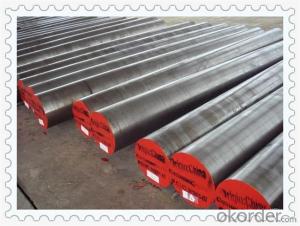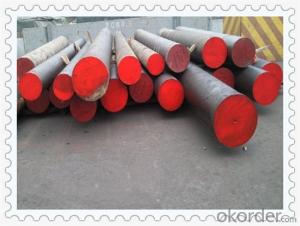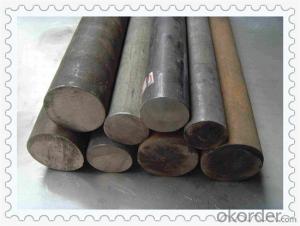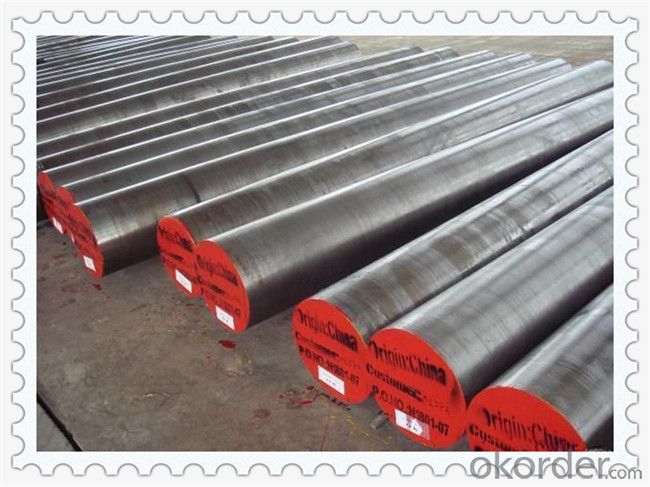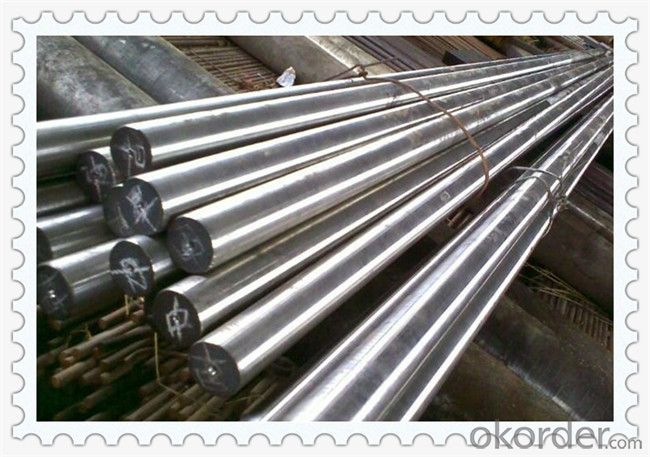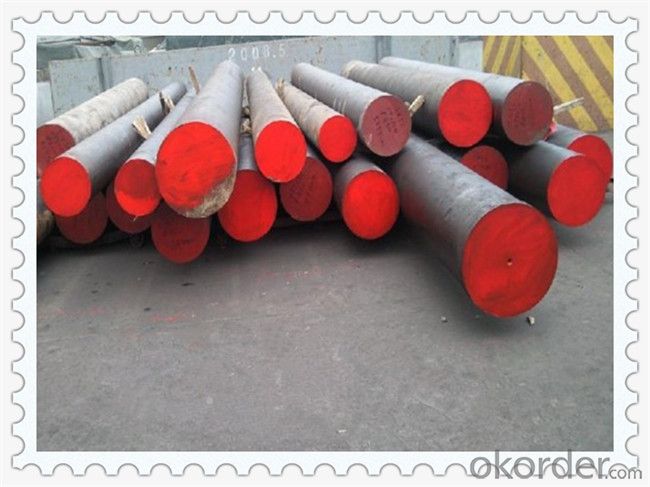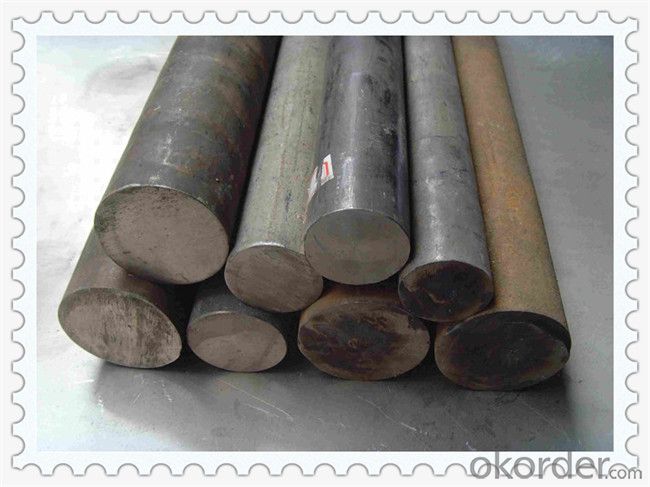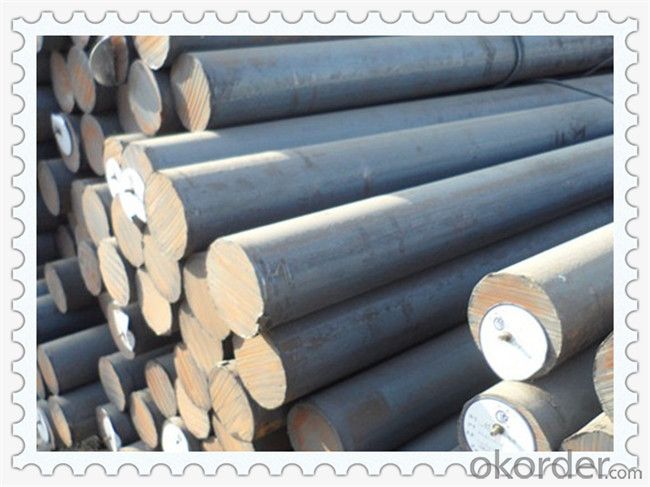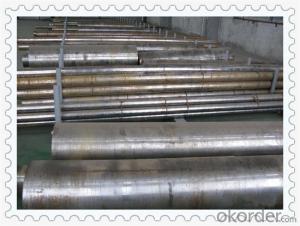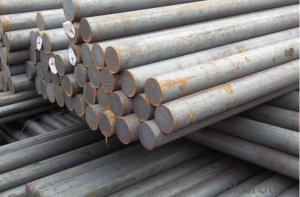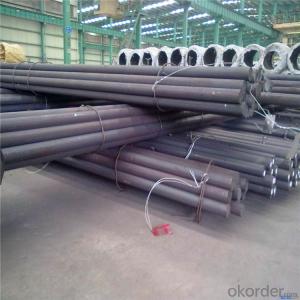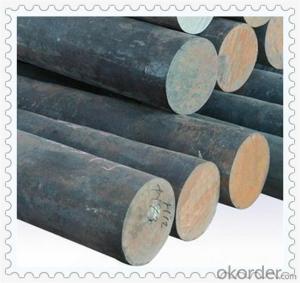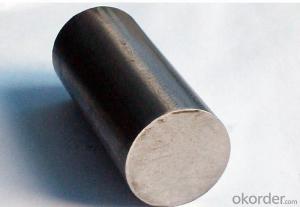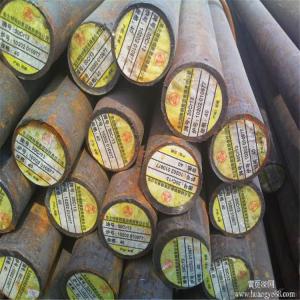AISI 4340 Forged Round Steel Bars
- Loading Port:
- China main port
- Payment Terms:
- TT OR LC
- Min Order Qty:
- 30 m.t.
- Supply Capability:
- 10000 m.t./month
OKorder Service Pledge
OKorder Financial Service
You Might Also Like
AISI 4340 Forged Round Steel Bars
Products Details
| aisi 4340 forged steel round bars | |||||||||||
| Comparative standard | Grade | C | Si | Mn | Cr | Mo | V | W | P | S | Ni |
| GB | 40CrNiMoA | 0.36-0.44 | 0.10-0.350 | 0.45-0.70 | 1.10-1.40 | 0.20-0.35 | 0.03 | 0.02 | 1.30-1.7 | ||
| AISI | 4337/4340 | ||||||||||
| JIS | SNCM8 | ||||||||||
| DIN | 34CrNiMo6/1.6582 | 0.34 | max 0.40 | 0.65 | 1.50 | 0.23 | 0.03 | 0.03 | 1.50 | ||
| Dimensions | |||||||||||
| Round bar | |||||||||||
| Dia:10mm~700mm | Length:2m~6m | ||||||||||
| Flat bar | |||||||||||
| Thickness:10mm~500mm | Length:2m~12m | ||||||||||
| *Dimensions can be customized | |||||||||||
| Heat Treatment | |||||||||||
| Normalizing | 850-880°C | - | |||||||||
| Stress Relieving | 650°C | air cooling | |||||||||
| Quenching | 830-860°C | oil quenching | |||||||||
| Tempering | 540-660°C | ||||||||||
| 1.Normalizing | |||||||||||
| Normalizing temperature : 850-880°C | |||||||||||
| 2.Stress Relieving | |||||||||||
| Stress relieving to remove machining stresses should be carried out by heating to approx.650°C, | |||||||||||
| holding for 1-2 hours at heat,followed by air cooling . | |||||||||||
| This operation is performed to reduce distortion during heat treatment . | |||||||||||
| 3.Hardening | |||||||||||
| Harden from a temperature of 830-860°C followed by oil quenching. | |||||||||||
| Quenching temperature in the end quench test is 850°C. | |||||||||||
| 4.Tempering | |||||||||||
| tempering temperature: 540-660°C | |||||||||||
| Detail information | |||||||||||
| Process | EAF+LF+VD+Forging+(Rolling)+Annealing Condition (optional) | ||||||||||
| Delivery Condition | Hot forged+Rough machined/turned surface | ||||||||||
| MOQ | 1 ton | ||||||||||
| Technical Data | According to customer’s requirements of chemical composition, physical properties and mechanical testing | ||||||||||
| Ultrasonic Test | Ultrasonic test according to SEP 1921-84 G3 D/d E/d | ||||||||||
| Applications | |||||||||||
| Hot extrusion dies, forging die forging hammer, forging press die, precision forging die well as aluminum, copper and alloys die-casting mold. | |||||||||||
| Relevant documents | |||||||||||
| Contract Documents | Contract, Debit Note, PI(Performa Invoice) | ||||||||||
| Shipping Documents | B/L(Bill of Loading), Packing List, Shipping list, CI(Commercial Invoice) | ||||||||||
| Certifications | SGS, ISO9001-2008, UT(Ultrasonic Test), CO(Certificate of Original), MTC(Milling Test Certificate) | ||||||||||
Products Show
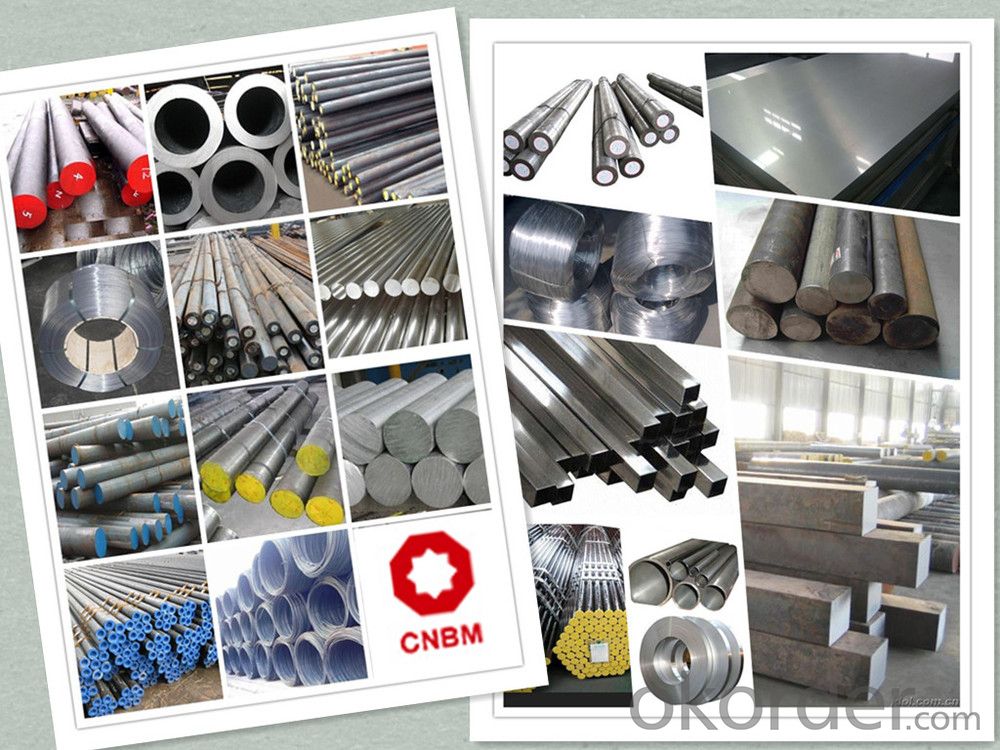
Product Overviews
| Product Name | Typical Grades | Diameter(mm) | Standard adopted |
| Carbon Steel | 20 (1020/S20C/C22) | Ø16-Ø300 |
GB/SAE/JIS/DIN
|
| 40 (1040/S40C/C40) | |||
| 45 (1045/S45C/C45) | |||
| Bearing Steel | GCr9 (51100/SUJ1) | Ø12-Ø250 | |
| GCr15 (52100/SUJ2/100Gr6) | |||
| GCr9SiMn (A485-Gr.1/SUJ3) | |||
Cr-Mo Steel | 20Cr (5120/SCr420H/20Cr4) | Ø12-Ø250 | |
| 40Cr (5140/SCr440/41Cr4) | |||
| 42CrMo(4140/SCM440/42CrMo4) | |||
| Gear Steel | 20CrNiMo | Ø16-Ø600 | |
| 20CrMn(5115/SMnC420/20MnCr5) | |||
| 20CrNiMo(8620/SNCM220/20CrMiMo2) |
Application
| Carbon Steel | Mold bottom, Plastic mold, Construction machinery parts Automobile parts, Security grills, Screens, Construction |
| Bearing Steel | Aerospace, Navigation, Nuclear energy, Chemical industry Electronic information, Petrochemical, Instrument and meter Transportation |
| Cr-Mo Steel | Mechanism & Fasteners gear, Stressed components for vehicles Engines and machines, Parts of larger cross-section |
| Gear Steel | All kinds of gears, Statically and dynamically stressed component for vehicles Engines and machine, Larger cross-section parts, Crankshafts |
Work Shop
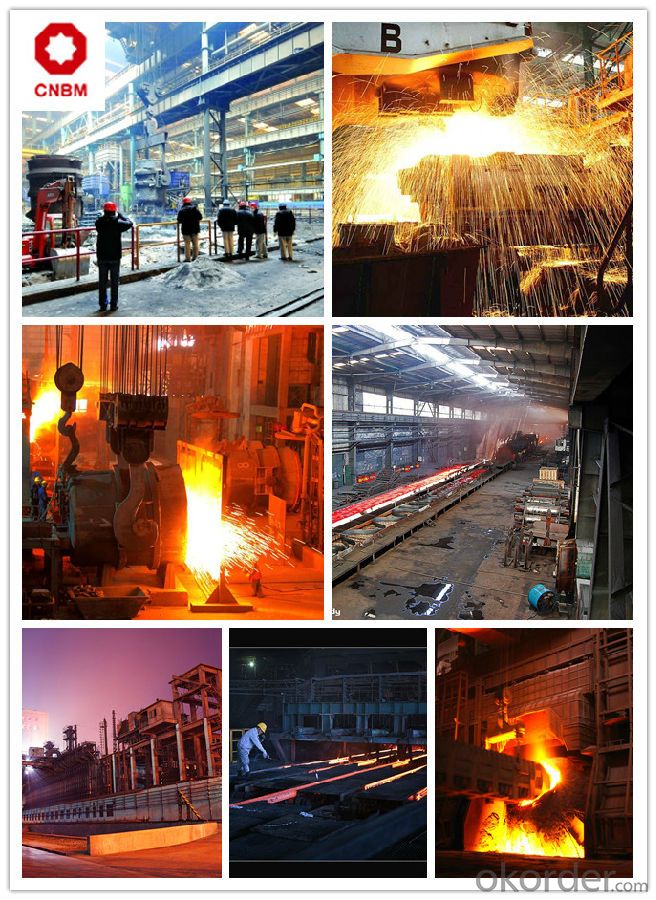
Company Information
CNBM International Corporation is the most important trading platform of CNBM group.
Whith its advantages, CNBM International are mainly concentrate on Cement, Glass, Iron and Steel, Ceramics industries and devotes herself for supplying high qulity series of refractories as well as technical consultancies and logistics solutions.

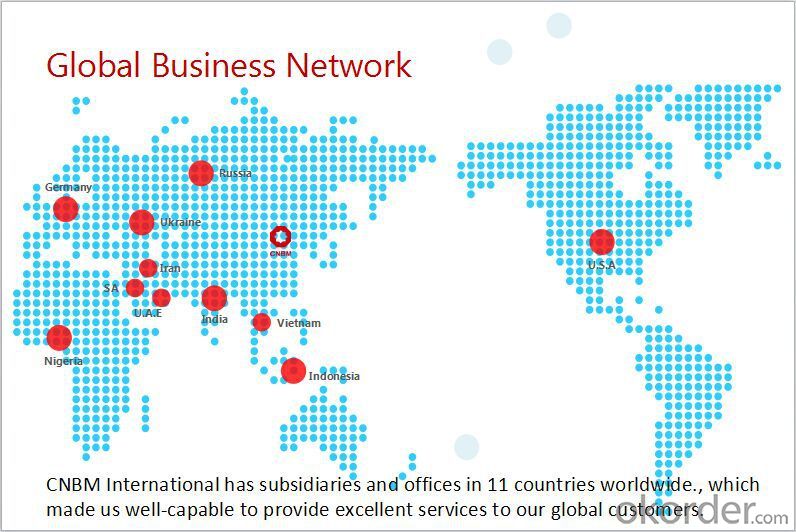
FAQ
1, Your advantages?
professional products inquiry, products knowledge train (for agents), smooth goods delivery, excellent customer solution proposale
2, Test & Certificate?
SGS test is available, customer inspection before shipping is welcome, third party inspection is no problem
3, Factory or Trading Company?
CNBM is a trading company but we have so many protocol factories and CNBM works as a trading department of these factories. Also CNBM is the holding company of many factories.
4, Payment Terms?
30% TT as deposit and 70% before delivery.
Irrevocable L/C at sight.
5, Trading Terms?
EXW, FOB, CIF, FFR, CNF
6, After-sale Service?
CNBM provides the services and support you need for every step of our cooperation. We're the business partner you can trust.
For any problem, please kindly contact us at any your convenient time.
We'll reply you in our first priority within 24 hours.
Packaging & Delivery
1, Packaging: seaworthy package or as required
2, Delivery: 35-45 days or based on quantity
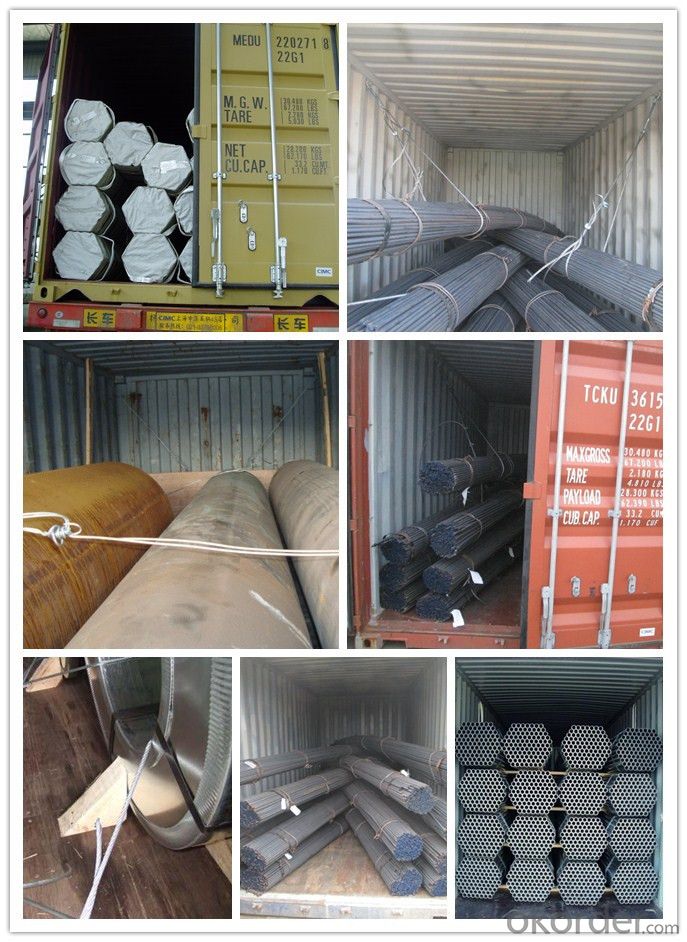
- Q: What are the different grades of carbon steel round bars for structural applications?
- The different grades of carbon steel round bars commonly used for structural applications include ASTM A36, ASTM A572, and ASTM A992.
- Q: What is the maximum weight capacity of a steel round bar?
- The maximum weight capacity of a steel round bar depends on its diameter, length, and the specific type of steel used.
- Q: Can steel round bars be used in the renewable energy industry?
- Yes, steel round bars can be used in the renewable energy industry. Steel round bars are versatile and durable, making them suitable for various applications in renewable energy projects. For example, they can be used as support structures for solar panels, wind turbine towers, and hydroelectric power plants. Steel round bars provide the necessary strength and stability to withstand the harsh environmental conditions often associated with renewable energy projects. Additionally, steel is a highly recyclable material, aligning with the sustainable principles of the renewable energy industry. Therefore, steel round bars are a viable and commonly used component in the construction and development of renewable energy infrastructure.
- Q: What are steel round bars?
- Made from steel, steel round bars are long, cylindrical metal bars that find applications in various industries such as construction, manufacturing, and engineering. Renowned for their strength, durability, and versatility, these bars are produced through a hot rolling process. This involves heating a solid steel billet and passing it through a series of rollers to achieve the desired shape and size. Available in a range of sizes and grades, steel round bars possess different properties depending on their specific application. They serve as structural components in buildings, shafts in machinery, support bars in concrete structures, and raw material for the production of other steel products. The construction and manufacturing sectors widely prefer steel round bars due to their high tensile strength and corrosion resistance.
- Q: What is the difference between a polished and a cold drawn steel round bar?
- A polished steel round bar refers to a steel bar that has undergone a polishing process, which involves using abrasive materials to remove any surface imperfections and create a smooth, shiny finish. Polishing enhances the aesthetic appearance of the steel bar and improves its corrosion resistance. This process is commonly used for decorative or architectural applications where the visual appeal is important. On the other hand, a cold drawn steel round bar is produced through a different manufacturing process. In this method, a steel bar is pulled through a die at room temperature to reduce its diameter and increase its length. This process results in a bar with a more precise and uniform diameter, as well as improved mechanical properties such as higher tensile strength and dimensional accuracy. Cold drawing also enhances the surface finish, but it may not achieve the same level of smoothness and shine as a polished bar. In summary, the main difference between a polished and a cold drawn steel round bar lies in the manufacturing process and the resulting properties. Polishing provides a smooth and shiny finish for aesthetic purposes, while cold drawing improves the dimensional accuracy and mechanical properties of the steel bar.
- Q: Can steel round bars be used in the construction of buildings?
- Indeed, the utilization of steel round bars is viable in the erection of edifices. In the realm of construction, steel round bars are widely employed as reinforcement within concrete frameworks, specifically in columns, beams, and slabs. Their inclusion imparts heightened robustness and stability to the structure, augmenting its resilience against various loads and forces. Notably, the circular configuration of these bars facilitates effortless bending and molding, thereby rendering them versatile and adaptable for diverse construction applications. What's more, steel round bars are renowned for their exceptional tensile strength, durability, and resistance to corrosion, rendering them an optimal choice for enduring and dependable building construction projects.
- Q: Why can't the grounding device be replaced by steel bar instead of round steel?
- The mechanical strength of the steel thread is destroyed. Because the supporting point is only the ground, it is easy to cut the steel directly if the thread is not vertical. Therefore, we need to use angle iron, steel pipe or smooth steel round bar.
- Q: What are the different types of carbon steel round bars?
- There are several different types of carbon steel round bars, including low carbon steel, medium carbon steel, and high carbon steel. Each type has varying levels of carbon content, which determines its strength and hardness. Low carbon steel round bars have the lowest carbon content and are more easily welded and formed. Medium carbon steel round bars have a higher carbon content and are stronger and more durable, making them suitable for applications that require higher strength. High carbon steel round bars have the highest carbon content and are extremely strong and hard, making them ideal for applications that require maximum strength and wear resistance.
- Q: What are the different types of steel round bar profiles?
- There are several different types of steel round bar profiles, including solid round bars, hollow round bars, and threaded round bars.
- Q: What is the difference between a smooth and a precision ground steel round bar?
- A smooth steel round bar has a surface that is free from any roughness or irregularities, providing a polished and sleek appearance. On the other hand, a precision ground steel round bar undergoes a specialized grinding process to achieve tight tolerances and a high degree of accuracy in its dimensions. This precision grinding ensures that the bar has consistent diameter and smoothness throughout its length, making it suitable for applications that require precise measurements and tight fits.
Send your message to us
AISI 4340 Forged Round Steel Bars
- Loading Port:
- China main port
- Payment Terms:
- TT OR LC
- Min Order Qty:
- 30 m.t.
- Supply Capability:
- 10000 m.t./month
OKorder Service Pledge
OKorder Financial Service
Similar products
Hot products
Hot Searches
Related keywords
